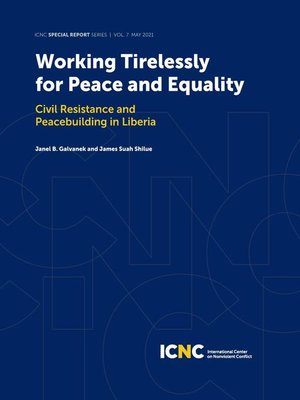Working Tirelessly for Peace and Equality
ebook ∣ Civil Resistance and Peacebuilding in Liberia
By Janel B. Galvanek

Sign up to save your library
With an OverDrive account, you can save your favorite libraries for at-a-glance information about availability. Find out more about OverDrive accounts.
Find this title in Libby, the library reading app by OverDrive.



Search for a digital library with this title
Title found at these libraries:
| Library Name | Distance |
|---|---|
| Loading... |
From the establishment of the Liberian state in 1847, the government's indirect rule over the majority indigenous Liberian population was oppressive and exploitative, and in 1980 the settler government was overthrown. But instead of uniting Liberians, the first indigenous Liberian president presided over a 10-year dictatorship, followed by a brutal civil war that lasted until 2003.
In this case study, we examine the methodologies and approaches of the various actors involved in civil resistance and peacebuilding throughout each phase of conflict in Liberia. Organizations like the Inter-Religious Council of Liberia, the Mano River Women's Peace Network, and the Catholic Justice and Peace Commission worked for peace and advocated for democratic change throughout the civil war. Then in 2003, the Mass Action for Peace began organizing protests, sit-ins, and vigils to actively pressure the warring parties to come to an agreement. These actors pursued strategies of peacebuilding and civil resistance simultaneously, which led to the complementarity of their work and increased the impact they had on the peace process.







